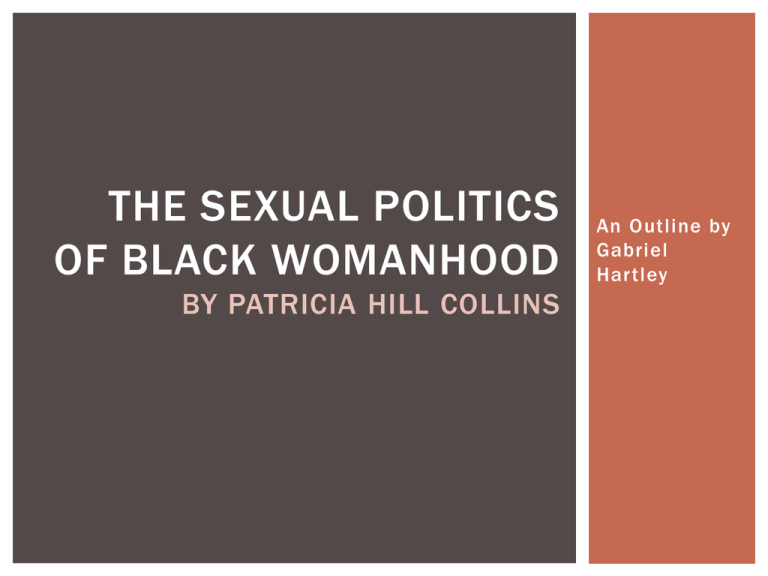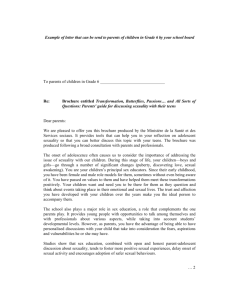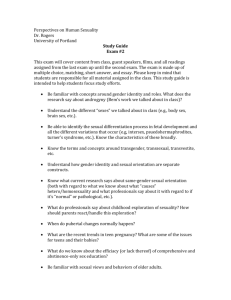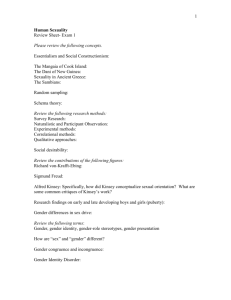
THE SEXUAL POLITICS
OF BLACK WOMANHOOD
BY PATRICIA HILL COLLINS
An Outline by
Gabriel
Hartley
VOICE & SILENCE
Writing letters to God and forming supportive relationships with
other Black women help Celie find her own voice, and her voice
enables her to transcend the fear and silence of her childhood.
By creating Celie and giving her the language to tell of her
sexual abuse, Walker adds Celie’s voice to muted yet growing
discussions of the sexual politics of Black womanhood. But
when it comes to other important issues concerning Black
women’s sexuality, U.S. Black women have found it almost
impossible
to
say
what
has
happened.
(124)
The convergence of all of these factors—the suppression of
Black women’s voice by dominant groups, Black women’s
struggles to work within the confines of norms of racial
solidarity, and the seeming protections of fered by a culture of
dissemblance—influences yet another factor shaping patterns of
silence. In general, U.S. Black women have been reluctant to
acknowledge the valuable contributions of Black lesbian
feminist theory in reconceptualizing Black women’s sexuality.
4 FACTORS
the suppression of Black women’s voice by dominant groups
Black women’s struggles to work within the confines of norms
of racial solidarity
the seeming protections of fered by a culture of dissemblance
the avoidance of Black lesbian feminist theory
“Heterosexual privilege is usually the only privilege that Black
women have.”
THE OUTSIDER-WITHIN STANDPOINT
Barbara Smith raises a critical point that can best be seen
through the outsider-within standpoint available to Black
lesbians—namely, that intersecting oppressions of sexuality,
race, gender, and class produce neither absolute oppressors
nor pure victims. (126)
INTERSECTING OPPRESSIONS
sexuality
race
gender
class
CLARENCE THOMAS AND ANITA HILL
violating Black “family secrets”
airing “dirty laundry” in public
SYSTEMS OF DOMINATION
Treating race, class, gender, and sexuality less as personal
attributes and more as systems of domination in which
individuals construct unique identities, Black feminist
analyses routinely identify multiple oppressions as important
to the study of Black women’s sexualities.
This contextualization in power relations generates a
particular kind of social constructionist argument, one that
views Black women’s sexualities as being constructed within
an historically specific matrix of domination characterized by
intersecting oppressions. (127)
BLACK WOMEN, INTERSECTING
OPPRESSIONS, AND SEXUAL POLITICS
Whereas sexuality is part of intersecting oppressions, the
ways in which it can be conceptualized dif fer. Sexuality can be
analyzed as a freestanding system of oppression similar to
oppressions of race, class, and gender. This approach views
heterosexism as a system of power that victimizes Black
women in partic- ular ways. Within heterosexism as a system
of oppression, African- American women find that their
distinctive group placement within hierarchies of race, class,
and gender shape the experiences of Black women as a
collectivity as well as the sexual histories of individual Black
women. (128)
2 ND APPROACH
A second approach examines how sexualities become
manipulated within class, race, nation, and gender as
distinctive systems of oppression and draw upon heterosexist
assumptions to do so. Regulating Black women’s sexualities
emerges as a distinctive feature of social class exploitation,
of institutionalized racism, of U.S. nation -state policies, and
of gender oppression. In essence, this approach suggests that
both the sexual meanings assigned to Black women’s bod - ies
as well as the social practices justified by sexual ideologies
reappears across seemingly separate systems of oppression.
3 RD APPROACH
Yet another approach views sexuality as a specific site of
intersectionality where intersecting oppressions meet.
Studying Black women’s sexualities reveals how sexuality
constitutes one important site where heterosexism, class,
race, nation, and gender as systems of oppression converge.
For Black women, ceding control over self -definitions of Black
women’s sexualities upholds multiple oppressions. This is
because all systems of oppression rely on harnessing the
power of the erotic. In contrast, when self -defined by Black
women ourselves, Black women’s sexualities can become an
important place of resistance. Just as harnessing the power of
the erotic is important for domination, reclaiming and self defining that same eroticism may constitute one path toward
Black women’s empowerment.
THREE APPROACHES OUTLINE
Heterosexism as a System of Power (128)
Sexuality within Distinctive Systems of Class, Race, Gender,
and Nation (132)
Sexuality as one important social location that joins these
distinctive systems of oppression in the regulation of Back
women’s bodies (134-35)
pornography (135)
prostitution (143)
rape & sexual violence (146)
CONCLUSION
Another ef fect of this legacy of sexual violence concerns the
significance of Black women’s continued silences concerning
rape. But Black women’s silence about rape obscures an
important issue: Most Black women are raped by Black men.
While the historical legacy of the triad of pornography,
prostitution, and the institutionalized rape of Black women
may have created the larger social context within which all
African- Americans reside, the unfortunate current reality is
that many Black men have internalized the controlling images
applied to Black women.
who has the power to define








